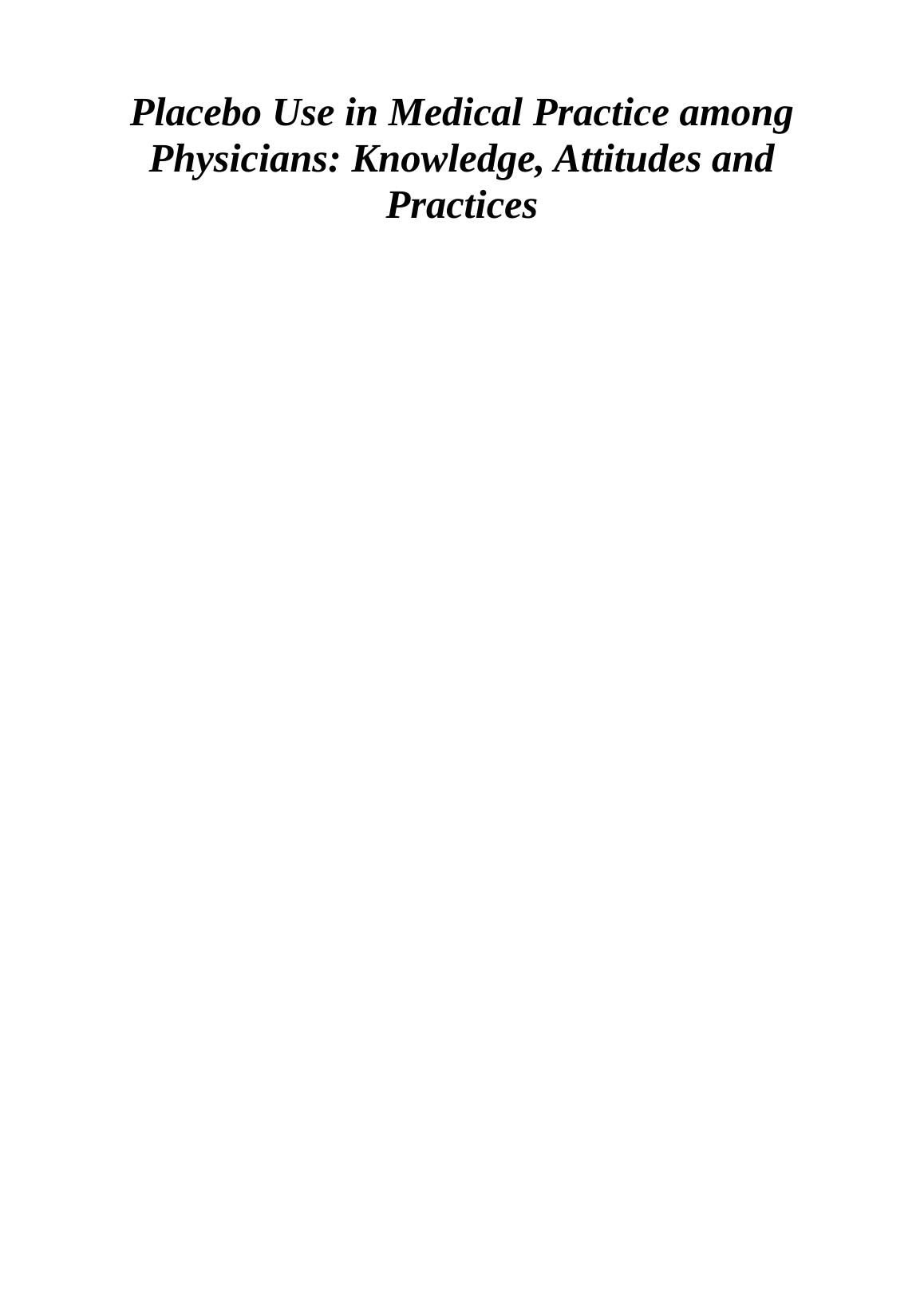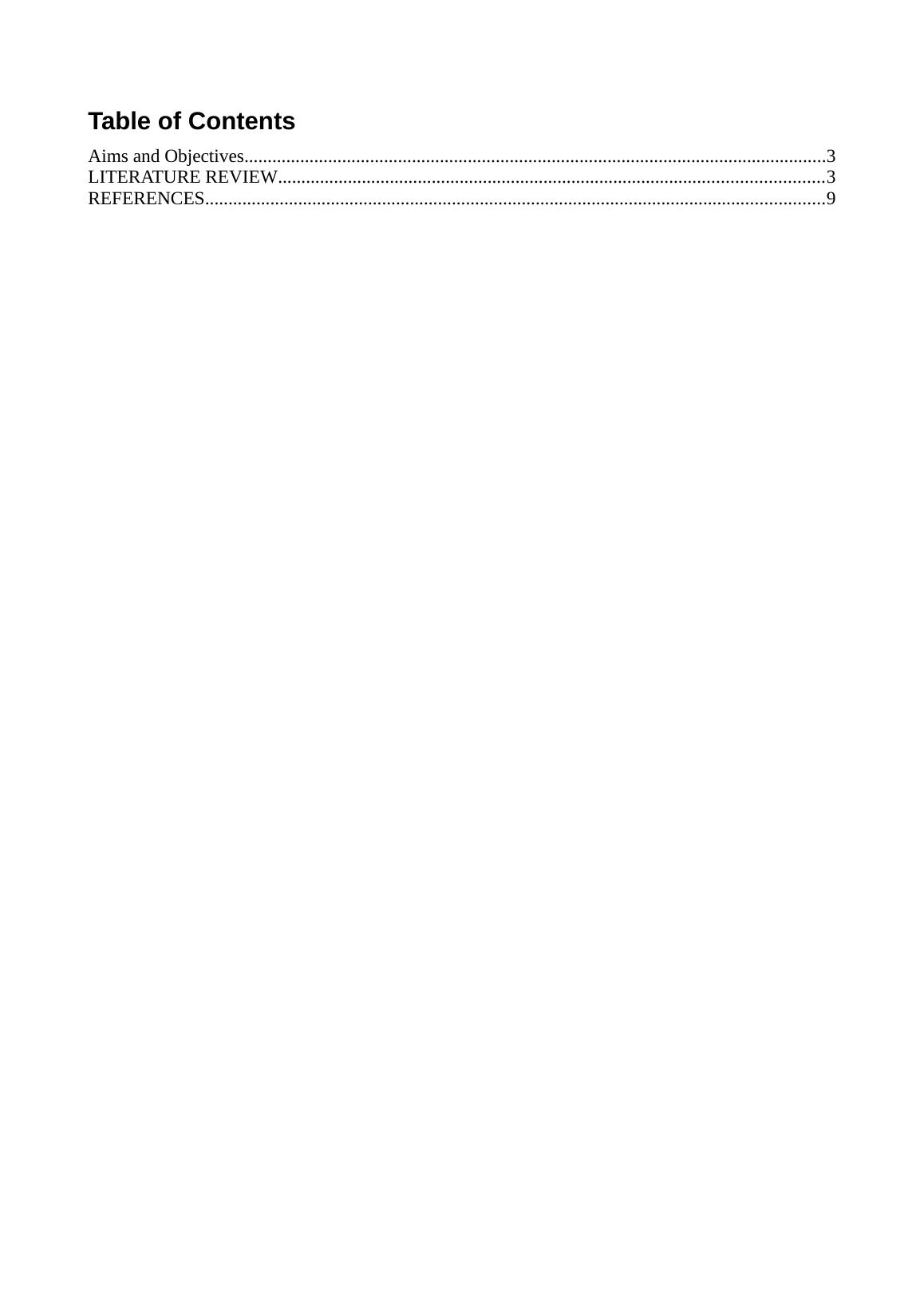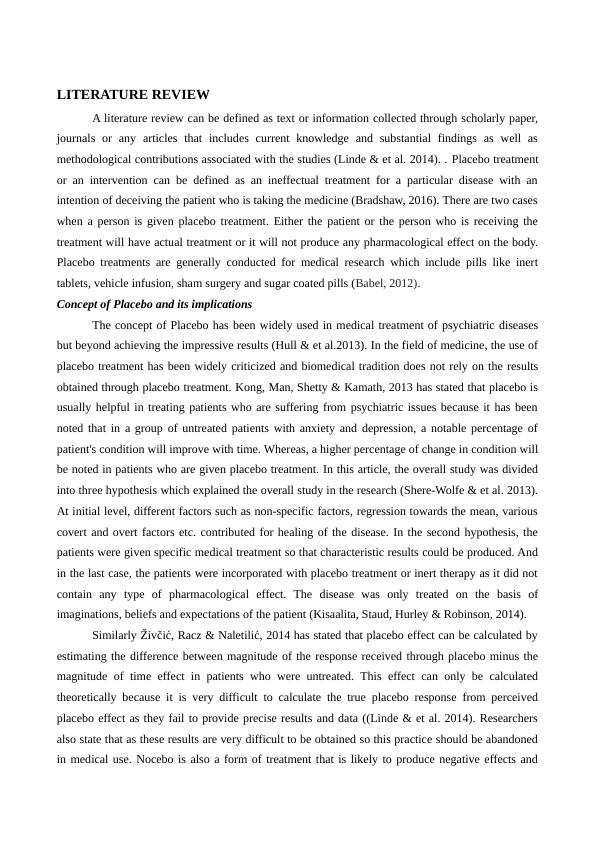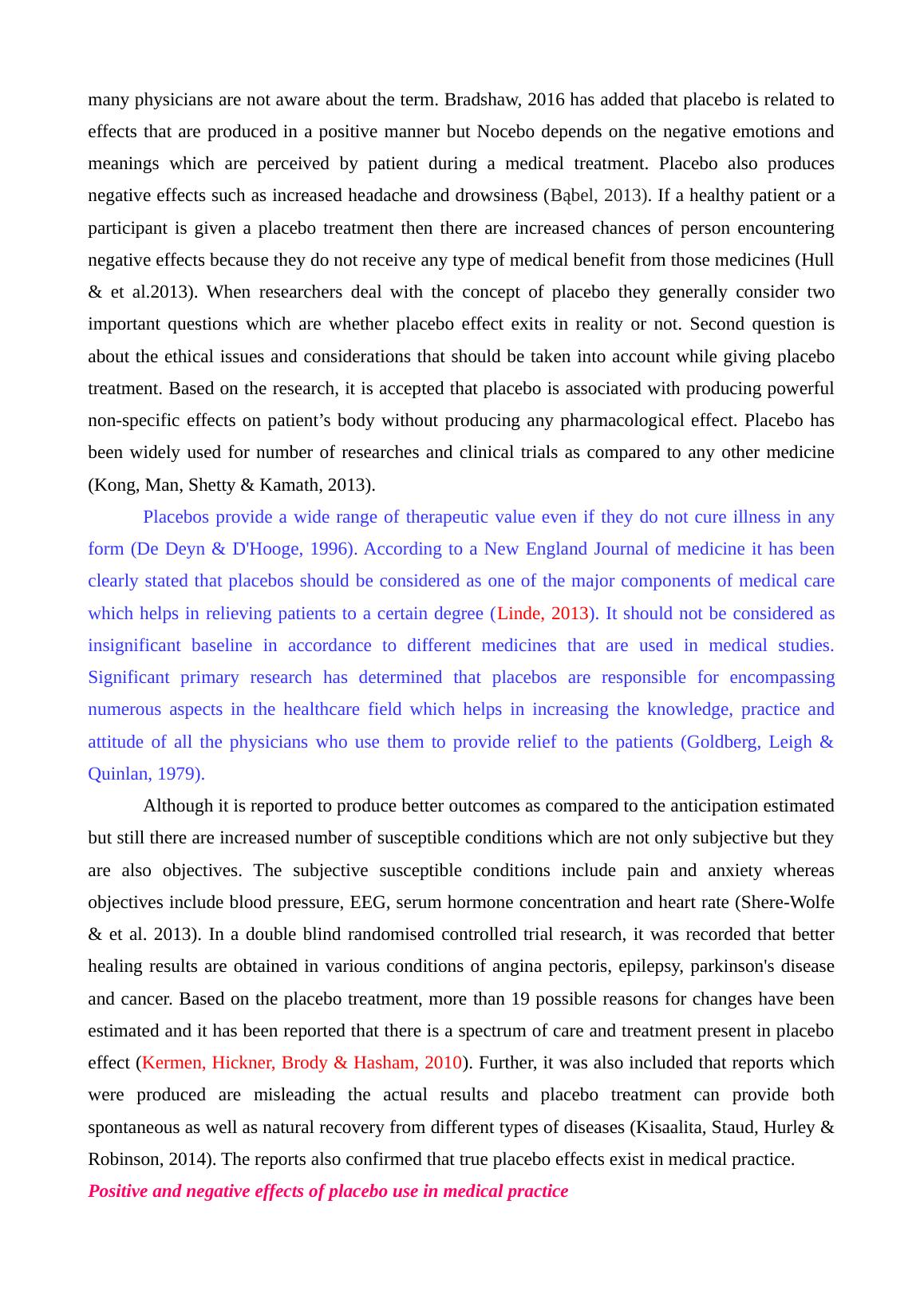Ask a question from expert
Use of placebo: Knowledge, attitude and practice among medical practitioners
11 Pages4871 Words237 Views
Added on 2019-12-17
Use of placebo: Knowledge, attitude and practice among medical practitioners
Added on 2019-12-17
BookmarkShareRelated Documents
Placebo Use in Medical Practice amongPhysicians: Knowledge, Attitudes andPractices

Table of ContentsAims and Objectives.............................................................................................................................3LITERATURE REVIEW.....................................................................................................................3REFERENCES.....................................................................................................................................9

LITERATURE REVIEWA literature review can be defined as text or information collected through scholarly paper,journals or any articles that includes current knowledge and substantial findings as well asmethodological contributions associated with the studies (Linde & et al. 2014). .Placebo treatmentor an intervention can be defined as an ineffectual treatment for a particular disease with anintention of deceiving the patient who is taking the medicine (Bradshaw, 2016). There are two caseswhen a person is given placebo treatment. Either the patient or the person who is receiving thetreatment will have actual treatment or it will not produce any pharmacological effect on the body.Placebo treatments are generally conducted for medical research which include pills like inerttablets, vehicle infusion, sham surgery and sugar coated pills (Babel, 2012).Concept of Placebo and its implicationsThe concept of Placebo has been widely used in medical treatment of psychiatric diseasesbut beyond achieving the impressive results (Hull & et al.2013). In the field of medicine, the use ofplacebo treatment has been widely criticized and biomedical tradition does not rely on the resultsobtained through placebo treatment. Kong, Man, Shetty & Kamath, 2013 has stated that placebo isusually helpful in treating patients who are suffering from psychiatric issues because it has beennoted that in a group of untreated patients with anxiety and depression, a notable percentage ofpatient's condition will improve with time. Whereas, a higher percentage of change in condition willbe noted in patients who are given placebo treatment. In this article, the overall study was dividedinto three hypothesis which explained the overall study in the research (Shere-Wolfe & et al. 2013).At initial level, different factors such as non-specific factors, regression towards the mean, variouscovert and overt factors etc. contributed for healing of the disease. In the second hypothesis, thepatients were given specific medical treatment so that characteristic results could be produced. Andin the last case, the patients were incorporated with placebo treatment or inert therapy as it did notcontain any type of pharmacological effect. The disease was only treated on the basis ofimaginations, beliefs and expectations of the patient (Kisaalita, Staud, Hurley & Robinson, 2014). Similarly Živčić, Racz & Naletilić, 2014 has stated that placebo effect can be calculated byestimating the difference between magnitude of the response received through placebo minus themagnitude of time effect in patients who were untreated. This effect can only be calculatedtheoretically because it is very difficult to calculate the true placebo response from perceivedplacebo effect as they fail to provide precise results and data ((Linde & et al. 2014). Researchersalso state that as these results are very difficult to be obtained so this practice should be abandonedin medical use. Nocebo is also a form of treatment that is likely to produce negative effects and

many physicians are not aware about the term. Bradshaw, 2016 has added that placebo is related toeffects that are produced in a positive manner but Nocebo depends on the negative emotions andmeanings which are perceived by patient during a medical treatment. Placebo also producesnegative effects such as increased headache and drowsiness (Bąbel, 2013). If a healthy patient or aparticipant is given a placebo treatment then there are increased chances of person encounteringnegative effects because they do not receive any type of medical benefit from those medicines (Hull& et al.2013). When researchers deal with the concept of placebo they generally consider twoimportant questions which are whether placebo effect exits in reality or not. Second question isabout the ethical issues and considerations that should be taken into account while giving placebotreatment. Based on the research, it is accepted that placebo is associated with producing powerfulnon-specific effects on patient’s body without producing any pharmacological effect. Placebo hasbeen widely used for number of researches and clinical trials as compared to any other medicine(Kong, Man, Shetty & Kamath, 2013). Placebos provide a wide range of therapeutic value even if they do not cure illness in anyform (De Deyn & D'Hooge, 1996). According to a New England Journal of medicine it has beenclearly stated that placebos should be considered as one of the major components of medical carewhich helps in relieving patients to a certain degree (Linde, 2013). It should not be considered asinsignificant baseline in accordance to different medicines that are used in medical studies.Significant primary research has determined that placebos are responsible for encompassingnumerous aspects in the healthcare field which helps in increasing the knowledge, practice andattitude of all the physicians who use them to provide relief to the patients (Goldberg, Leigh &Quinlan, 1979).Although it is reported to produce better outcomes as compared to the anticipation estimatedbut still there are increased number of susceptible conditions which are not only subjective but theyare also objectives. The subjective susceptible conditions include pain and anxiety whereasobjectives include blood pressure, EEG, serum hormone concentration and heart rate (Shere-Wolfe& et al. 2013). In a double blind randomised controlled trial research, it was recorded that betterhealing results are obtained in various conditions of angina pectoris, epilepsy, parkinson's diseaseand cancer. Based on the placebo treatment, more than 19 possible reasons for changes have beenestimated and it has been reported that there is a spectrum of care and treatment present in placeboeffect (Kermen, Hickner, Brody & Hasham, 2010). Further, it was also included that reports whichwere produced are misleading the actual results and placebo treatment can provide bothspontaneous as well as natural recovery from different types of diseases (Kisaalita, Staud, Hurley &Robinson, 2014). The reports also confirmed that true placebo effects exist in medical practice.Positive and negative effects of placebo use in medical practice

End of preview
Want to access all the pages? Upload your documents or become a member.
Related Documents
Placebo - Medical Science Assignmentlg...
|19
|8066
|50
Placebo Effect and Depressionlg...
|5
|790
|106
Placebo Effect Experimentlg...
|39
|4271
|416
The greater willingness by clinicians to prescribelg...
|13
|3524
|19
The controversy arises on the continuationlg...
|5
|2395
|9
Applied Research Project in Public Healthlg...
|14
|3662
|43